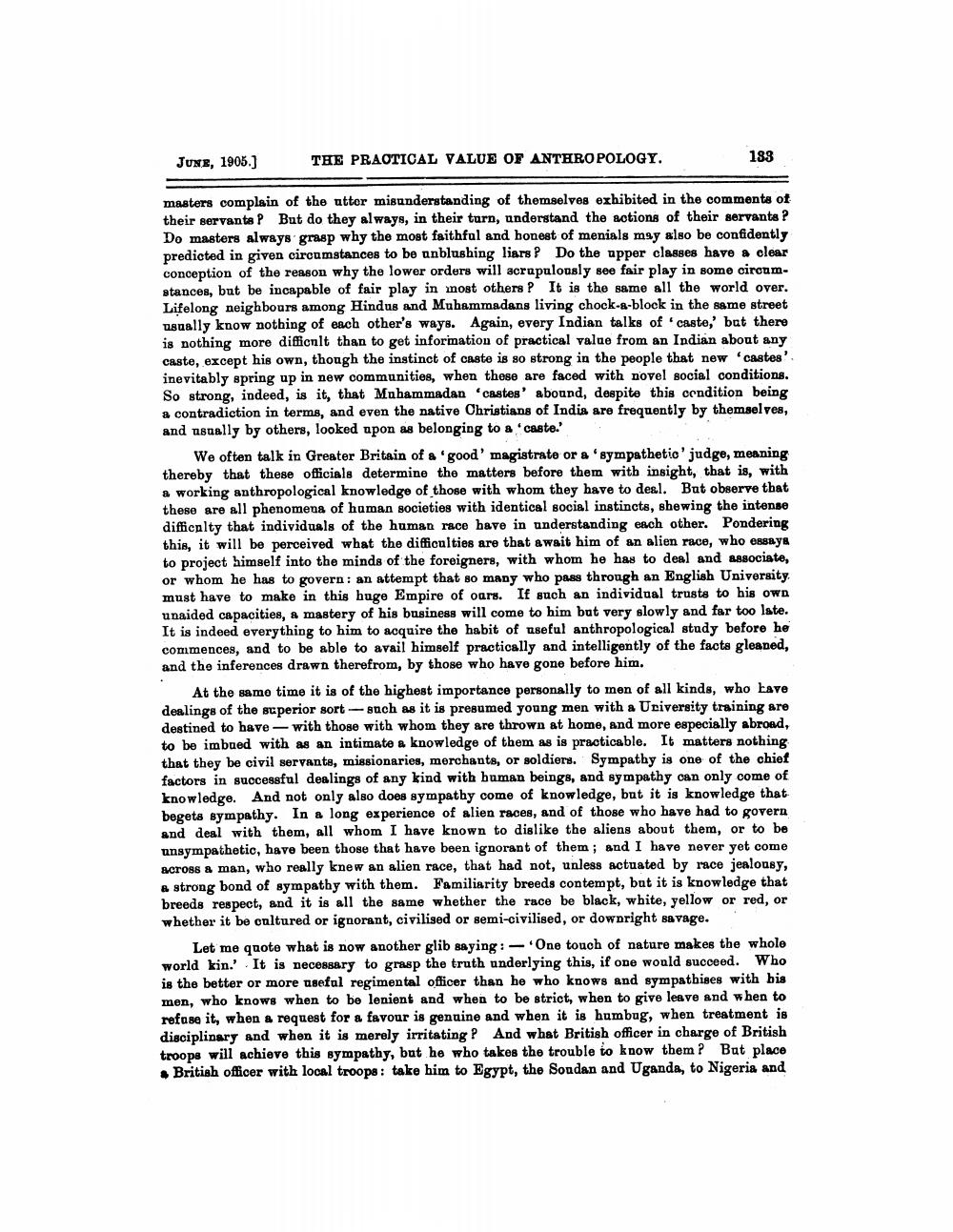________________
JUNE, 1905.)
THE PRAOTICAL VALUE OF ANTHROPOLOGY.
183
masters complain of the attor misunderstanding of themselves exhibited in the comments of their servants ? But do they always, in their turn, understand the actions of their servants ? Do masters always grasp why the most faithful and honest of menials may also be confidently predicted in given circumstances to be unblushing liars P Do the upper classes have a clear conception of the reason why the lower orders will acrupulously see fair play in some circumstances, but be incapable of fair play in most others? It is the same all the world over. Lifelong neighbours among Hindus and Muhammadans living chock-a-block in the same street usually know nothing of each other's ways. Again, every Indian talks of caste,' but there is nothing more diffionit than to get information of practical value from an Indian about any caste, except his own, though the instinct of caste is so strong in the people that new castes'. inevitably spring up in new communities, when these are faced with novel social conditions. So strong, indeed, is it, that Muhammadan "castes abound, despite this condition being a contradiction in terms, and even the native Christians of India are frequently by themselves, and usually by others, looked apon as belonging to a 'caste.'
We often talk in Greater Britain of a 'good' magistrate or a 'sympathetic' judge, meaning thereby that these officials determine the matters before them with insight, that is, with a working anthropological knowledge of those with whom they have to deal. Bat observe that these are all phenomena of human societies with identical social instincts, shewing the intense difficulty that individuals of the human race have in understanding each other. Pondering this, it will be perceived what the difficulties are that await him of an alien race, who essays to project himself into the minds of the foreigners, with whom he has to deal and associate, or whom he has to govern: an attempt that so many who pass through an English University must have to make in this huge Empire of oars. If such an individual trusts to his own unaided capacities, a mastery of his business will come to him but very slowly and far too late. It is indeed everything to him to acquire the habit of useful anthropological study before he commences, and to be able to avail himself practically and intelligently of the facts gleaned, and the inferences drawn therefrom, by those who have gone before him.
At the same time it is of the highest importance personally to men of all kinds, who have dealings of the superior sort - such as it is presumed young men with a University training are destined to have with those with whom they are thrown at home, and more especially abroad, to be imbued with as an intimate a knowledge of them as is practicable. It matters nothing that they be civil servants, missionaries, merchants, or soldiers. Sympathy is one of the chief factors in successful dealings of any kind with human beings, and sympathy can only come of knowledge. And not only also does sympathy come of knowledge, but it is knowledge that begets sympathy. In a long experience of alien races, and of those who have had to govern and deal with them, all whom I have known to dislike the aliens about them, or to be unsympathetic, have been those that have been ignorant of them; and I have never yet come across a man, who really knew an alien race, that had not, unless actuated by race jealousy, a strong bond of sympathy with them. Familiarity breeds contempt, but it is knowledge that breeds respect, and it is all the same whether the race be black, white, yellow or red, or whether it be onltured or ignorant, civilised or semi-civilised, or downright savage.
Let me quote what is now another glib saying: -One touch of nature makes the whole world kin' It is necessary to grasp the truth underlying this, if one would succeed. Who is the better or more useful regimental officer than he who knows and sympathises with his men, who knows when to be lenient and when to be strict, when to give leave and when to refuse it, when a request for a favour is genuine and when it is humbug, when treatment is disciplinary and when it is merely irritating? And what British officer in charge of British troops will achieve this sympathy, but he who takes the trouble to know them ? Bat place
British officer with local troops: take him to Egypt, the Soudan and Uganda, to Nigeria and




